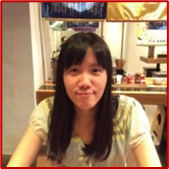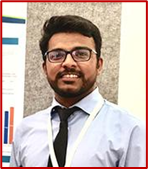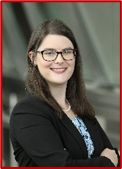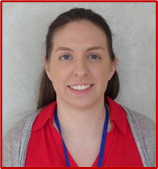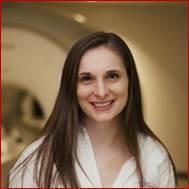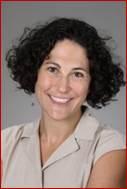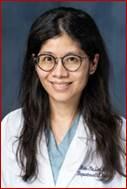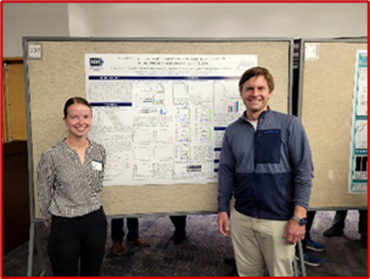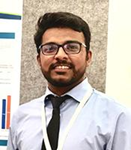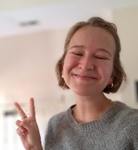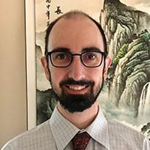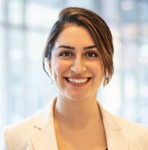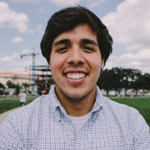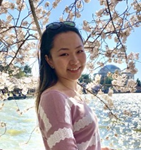Dr. Mala Ananth, K22 Recipient

Congratulations to Dr. Mala Ananth, a postdoc fellow in the in the Circuits, Synapses, and Molecular Signaling Section led by Dr. Lorna Role, who recently received a NIA K22 Career Transition Award for her proposal titled Molecular Determinants of Age-Related Cognitive Decline in the Basal Forebrain to Lateral Entorhinal Cortex Circuit.
Dr. Ananth’s postdoctoral work evaluates the mechanisms underlying resilience and vulnerability of cholinergic neurons in the brain. With her award, Dr. Ananth will establish an independent lab that will aim to identify molecular signatures of vulnerability in the basal forebrain to lateral entorhinal cortex circuit, which is uniquely susceptible with age.
Dr. Sean Cleary - NCFA Recipient

Congratulations to Dr. Sean Cleary from Dr. Miquel Holmgren’s lab who recently received a NINDS Competitive Fellowship Award (NCFA) for his project title Investigating the Role of the Polyamine Pump in Neuronal Health and Parkinson’s Disease.
Dr. Cleary’s will study the ATP13A2 membrane transport enzyme responsible for exporting polyamines from lysosomal lumens to the cytosol. Loss of ATP13A2 function is the cause of Parkinson’s disease type 9 (PARK9), a rare form of Parkinsonism with particularly early-onset; however, very little is known about how ATP13A2 transport contributes to lysosomal physiology or prevents neurodegenerative disease. Our investigation will elucidate the roles and regulatory mechanisms that modulate ATP13A2 function in the human brain to uncover new insights into the early mechanisms of Parkinson’s disease.
Yonatan Serlin, M.D. – NCREA Recipient

Congratulations to our next NINDS Clinical Research Excellence Award (NCREA) recipient – Yonatan Serlin, M.D., Research Fellow under the supervision of Dr. Sara Inati, head of the Neurophysiology of Epilepsy Unit. He was given a monetary travel award for his abstract titled, “Prevalence and Clinical Association of Paroxysmal Slowing in Epilepsy,” which was accepted and presented at the December American Epilepsy Society (AES) annual meeting. Dr. Serlin will also be given the opportunity to present his abstract at an upcoming 2024 Grand Rounds case segment.
This award is aimed at promoting clinical research and recognizing clinical research achievements among NINDS Clinical Research Trainees and Clinical Nursing Staff. Monetary awards, where funding is added to the PI’s budget to supplement the awardee’s research and training activities.
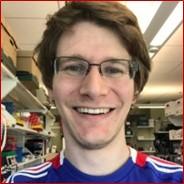
The Association for Frontotemporal Degeneration (AFTD) Holloway Postdoctoral Fellowship program provides funding for the next generation of FTD researchers. By supporting talented young investigators during this critical phase of their scientific training, AFTD aims to inspire a long-standing commitment to FTD research.
We are very excited to announce that John Replogle, Ph.D. – a Postdoctoral Fellow in Dr. Michael Ward’s lab – received the AFTD Holloway Postdoctoral Fellowship. Dr. Replogle is studying neurodegenerative diseases using molecular biology, cell biology, and genetics. In the Ward lab, he is investigating the role of TMEM106B in Frontotemporal Dementia and Alzheimer’s Disease and exploring the impact of TMEM106B aggregates on neuron health. Dr. Replogle completed a Ph.D. in Biology at the Massachusetts Institute of Technology where he studied chemotherapy resistance in cancer.

Sahba Seddighi – OxCam M.D./Ph.D. Student
Sahba Seddighi – an OxCam M.D./Ph.D. student in Dr. Michael Ward’s lab – recently had a publication in Science Translational Medicine titled, “Mis-spliced transcripts generate de novo proteins in TDP-43–related ALS/FTD.” The results suggest potential mechanisms for disease pathogenesis in amyotrophic lateral sclerosis and dementia. Her work was also featured in NIH News.
Additionally, the International Biomedical Research Alliance sponsored a travel award for Sahba. This allowed her to travel to the laboratory of Dr. Nicholas Seyfried, Professor of Biochemistry and Neurology, and Director of the Emory Integrated Proteomics Core at the Emory University School of Medicine, and gain valuable experience.
Congratulations Drs. Jayachandran and Mohan – Recipients of the NINDS Competitive Fellowship Award (NCFA)
The NCFA is the NINDS Intramural equivalent of the Postdoctoral NRSA Fellowship. This funding opportunity is for postdoctoral fellows within their first year of a designated laboratory of the NINDS Intramural Program or within 12-months of starting an NINDS fellowship appointment within a designated lab. We are proud to announce that both Drs. Maanasa Jayachandran, a postdoctoral fellow under Dr. Joshua Gordon and Dr. David Kupferschmidt; and Uma Mohan, a postdoctoral fellow in Dr. Kareem Zaghloul’s lab, are recent recipients of the highly competitive NCFA!
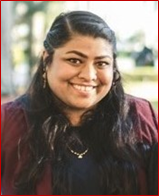
Maanasa completed a dual B.S. degree in Neuroscience and Molecular Biochemistry at the University of Miami. Additionally, she engaged in practical research by working with Dr. Grace Zhai, focusing on understanding how the active zone protein Bruchpilot (BRP) is maintained by nicotinamide mononucleotide adenylyltransferase (NMNAT) in Drosophila melanogaster. She later pursued an M.S. in Brain and Mind Sciences at the University of Sydney, Australia, and completed a Ph.D. at Florida International University (FIU) under the mentorship of Dr. Timothy Allen. Her graduate work produced multiple first-author publications in high-profile journals, including Nature Communications and Cell Reports. Moreover, Maanasa has been the lead author on multipole conference abstracts and talks and her research has earned numerous awards.
With a focus on understanding working memory and uncovering how this ability emerges from the interactions of the medial prefrontal cortex and hippocampus, the title of Maanasa’s NCFA proposal was “Role of Vasoactive Intestinal Polypeptide-expressing Interneurons in Mouse Hippocampal-Prefrontal Oscillatory Synchrony and Neural Coding of Spatial Working Memory.” Her long-term goal is to become an independent neuroscientist at a research-focused university producing and disseminating scientific knowledge related to the mechanisms of prefrontal-hippocampal circuitry involved in the temporal and spatial organization of memory and behavior. Support from this NCFA will advance this goal by providing a structured research training plan as well as enhance her professional identity by giving Maanasa an opportunity to investigate new and challenging questions at the intersection of neural circuits and behavior.

Uma received her B.S. in Biomedical Engineering and Applied Math and Statistics from Johns Hopkins University, followed by a M.Eng. in Biomedical Engineering from Cornell University. After briefly working as a software engineer, she completed her Ph.D. at Columbia University in Dr. Joshua Jacobs’ Electrophysiology, Memory, and Spatial Navigation Lab. She explored the electrophysiological effects of direct electrical brain stimulation in humans and spatiotemporal patterns of brain oscillations during memory. At NINDS she is investigating in more detail the neural signals related to memory and the effects of brain stimulation on those signals.
Uma’s NCFA proposal was “Characterization and prediction of the effects of direct electrical stimulation on neuronal activity in humans.” This award will support her future long-term goal of becoming an independent investigator focused on the use of brain stimulation to modulate neural activity to treat or prevent neurological and cognitive disorders, particularly those affecting memory processing. She aims to first answer fundamental questions of how stimulation affects neurophysiological activity in humans. To do this, she plans to develop computational models to predict neural responses to different types of stimulation and establish a framework for determining stimulation locations and parameters to evoke specific neural patterns. This project has the potential to lead to the optimal design of effective therapeutic stimulation protocols in the treatment and prevention of neurological disorders.
Archive
Welcome 2023 NINDS Clinical Fellows!
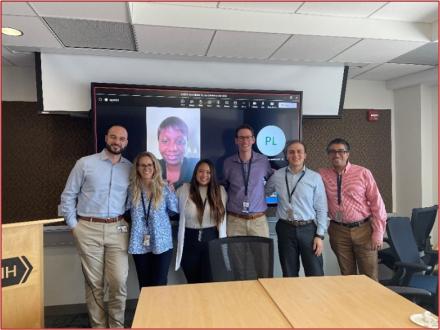
The Office of the Clinical Director announced our newest NINDS residents & clinical fellows! The trainees gathered with faculty for the NINDS clinical orientation held this past July, where they received the newest edition of the Clinical Fellows Handbook and met their peers.
Welcome Drs. Jonathan Fischell, Oday Halouli, Ann Ly, Meghan McAnally, Karan Nathani, Jonathan Solomonov, Adebola Awolesi, Evan Der, and Crystal Collier. Fun fact: While Drs. Jonathan Fischell, Karan Nathani and Jonathan Solomonov all graduated from the University of Maryland Medical Center this year (different programs), it was by chance they enrolled in the same NIH training program.
Dr. Rotem Or Bach Recipient of the NCREA
Congratulations to Clinical Fellow, Dr. Rotem Or Bach, the newest recipient of the NINDS Clinical Research Excellence Award (NCREA)! Rotem is a member of the Neuromuscular and Neurogenetic Disorders of Childhood Section where she is mentored by Dr. Carsten Bonnemann. Rotem received a monetary travel award for her late breaking abstract titled, “Impaired Iron-Sulfur Cluster Assembly Due to Biallelic Variants in CIAO1 Leads to a Novel Muscle Disease,” which was accepted and presented at the October World Muscle Society conference. Additionally, this work represents an international gene discovery and characterization collaborative effort with Dr. Nunziata Maio from NICHD, (PI, Dr. Tracey Rouault).
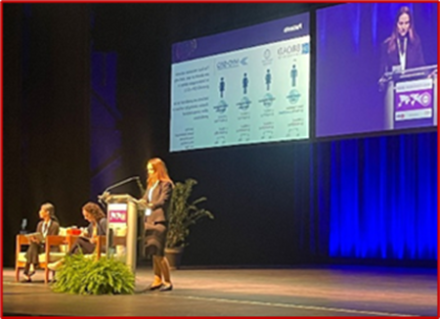
The work describes the clinical manifestations and the biochemical characterization associated with a novel disease gene, CIAO1, a key component of the cytoplasmic iron-sulfur assembly machinery. Rotem will also be given the opportunity to present her abstract at an upcoming 2024 Grand Rounds case segment. We’re thrilled with the recognition her work has received and look forward to where her research may take us.
The NCREA is an intramural award aimed at promoting clinical research and recognizing clinical research achievements among NINDS Clinical Research Trainees and Clinical Nursing Staff. For questions or more information on the next application cycle, e-mail NINDSClinREAwardComm@ninds.nih.gov.
OxCam Scholar Wins Prestigious Award
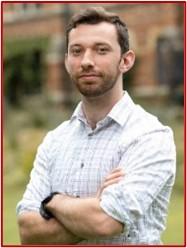
We are proud to announce that Mario Shammas, an M.D./Ph.D. candidate in the NIH Oxford-Cambridge (OxCam) Scholars Program who works in Dr. Derek Narendra’s lab and is co-mentored by Professor Patrick Chinnery (Cambridge), won the Gregory Paul Lenardo Basic Science Award for Discoveries in Cellular and Molecular Biology. The award, Dr. Michael Lenardo (NIH) in loving memory of his brother, recognizes discoveries of fundamental cellular, molecular, or genetic processes using model systems that advance scientific understanding of biological processes in higher organisms. It is important to note that this is the first time an OxCam alumnus (Dr. Narendra) has mentored a recipient of this prestigious award. Mr. Shammas was honored at the 2023 NIH Global Doctoral Partnerships Colloquium Gala and Awards Ceremony for published work that exemplifies using model systems to uncover fundamental biological processes in higher organisms. Additionally, he found that OMA1 was critical for neonatal survival conditionally in the setting of inner mitochondrial membrane stress, coordinating local and global stress responses to reshape the mitochondrial network and proteome.
Mr. Shammas received his B.S. in Neuroscience from the University of Michigan in 2016. He is pursuing his M.D. at the Prtizker School of Medicine, University of Chicago, and his Ph.D. at the University of Cambridge. Additionally, his work in Dr. Narendra’s group has focused on the paralogous mitochondrial proteins CHCHD2 and CHCHD10.
Dr. Garcia – Recipient of the Intramural Competitive Fellowship Award (NCFA)
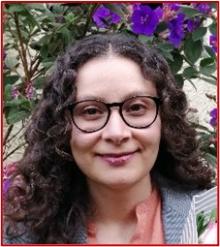
The NCFA is the NINDS Intramural equivalent of the Postdoctoral NRSA Fellowship. This funding opportunity is for postdoctoral fellows within their first year of a designated laboratory of the NINDS Intramural Program or within 12 months of starting an NINDS fellowship appointment within a designated lab. We are proud to announce that Dr. Martha Garcia – A Postdoctoral Fellow in Dr. Mark Wagner’s lab – was approved for an NCFA for her proposal on “Uncovering the computations in the cortico-cerebellar circuit using an optical brain-machine interface.”
Dr. Garcia completed her Ph.D. in biomedical engineering at the University of Toronto, where she developed brain-machine interfaces based on cortical single-neuron activity in a rodent model. Her current research focuses on studying how neurons in the cerebellum and neocortex interact to perform computations that support cognitive learning. Dr. Garcia will implement a brain-machine interface paradigm, where mice will learn to volitionally modulate their own neural activity. Using this paradigm, she will: (1) study the cerebellar computations that contribute to this type of cognitive task; (2) examine how are these computations disrupted in a model of cerebellar ataxia; and (3) use this knowledge to design neuromodulation strategies that restore function in the neocortical-cerebellar circuit.
The NCFA will help her focus on her training goals to become an independent investigator.
Dr. Cupo Selected for NIGMS Postdoctoral Research Associate Training (PRAT) Program Fellowship

Congratulations Dr. Ryan Cupo! A Postdoctoral Research Fellow in Dr. Youle’s lab, Dr. Cupo was selected for a NIGMS PRAT Fellowship for his proposal titled “Protecting the cytosol from mitochondrial nucleotides.” This is a competitive three-year postdoctoral fellowship program that provides high quality research training in the basic biomedical sciences in NIH intramural research laboratories. The program prepares trainees for leadership positions in biomedical careers through mentored laboratory research, networking, and intensive career and leadership development activities.
Dr. Cupo completed his Ph.D. in Pharmacology in the Shorter Lab at the University of Pennsylvania, where he discovered the first human mitochondrial protein disaggregase, Skd3 (CLPB). His current research spans from yeast, to drosophila, to mice towards understanding a conserved pathway involved in regulating the escape of mitochondrial nucleotides into the cytoplasm and nucleus. The PRAT fellowship will enhance Dr. Cupo’s research project by promoting interactions with scholars in different fields who will provide valuable insights and perspectives.
Congratulations 2024 Fellows Award for Research Excellence (FARE) Winners!
Congratulations to the Latest NINDS Clinical Research Excellence Award (NCREA) Recipients!
The Next Chapter: Congratulations Dr. Paul Kramer

We are very happy to announce that Paul Kramer, Ph.D., a Postdoctoral Fellow working in Dr. Zayd Khaliq’s lab, has accepted a faculty position at the Department of Molecular, Cellular, and Developmental Biology, University of Michigan. Skilled in electrophysiology, animal models, data analysis, fluorescence microscopy, literature reviews, and genetics, Dr. Kramer completed his Ph.D. in Neuroscience at Oregon Health and Science University, under the mentorship of John T. Williams, Ph.D. He chose NINDS primarily to work with Dr. Khaliq, whose research has made a profound impact in the field. According to Dr. Kramer, NINDS has offered numerous advantages, such as active training and professional development, many teaching opportunities, and guaranteed funding throughout his intramural research training fellowship.
At Michigan, Dr. Kramer plans to merge his postdoctoral training with his graduate education in the neurobiology of substance use disorders by using electrophysiology and advance light imaging techniques to understand how axo-axonal neurotransmission in the mesoaccumbal dopaminergic pathway contributes to nicotine and ethanol use disorders. He also plans to study how prevalent axo-axonal neurotransmission is throughout the brain by recording from axons in other non-dopaminergic nuclei.
Kudos to Outstanding Poster Awardees
Serving on a Planning Committee as an NINDS Trainee

Did you know that NINDS trainees can help plan a symposium at NIH? Graduate student Poorva Jain recently served on the planning committee for the 19th Annual NIH Graduate Student Research Symposium. Poorva is an M.D.-Ph.D. student in the NIH Oxford-Cambridge Scholars Program. She is conducting research in the laboratory of Irene Cortese, M.D., Assistant Clinical Investigator in the Experimental Immunotherapeutics Unit. For her graduate work, Poorva studies the molecular underpinnings of progressive multifocal leukoencephalopathy (PML), a severe demyelinating disease of the central nervous system caused by the JC virus.
Check out our interview with Ms. Jain to learn more about this unique opportunity.
Dr. Sarah Hill wins the NIH Pathway to Independence Award!
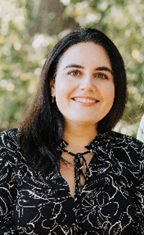
The NIH Pathway to Independence (K99/R00) Award program facilitates the timely transition of outstanding postdoctoral researchers from mentored, postdoctoral research positions to independent, tenure-track or equivalent faculty positions. We are proud to announce that Sarah Hill, Ph.D. is the latest recipient of this prestigious award. Dr. Hill is a Fellow mentored in the Inherited Neurodegenerative Diseases Unit under Dr. Michael Ward. Her research focuses on: (1) how TDP-43, an RNA-binding protein linked to neurodegenerative diseases including ALS/FTD and Alzheimer’s disease, is involved in regulation of RNA splicing; and (2) how the loss of TDP-43 function causes a series of secondary effects using human iPSC-derived neurons.
About Dr. Hill: Dr. Hill completed a B.S. in biochemistry and molecular biology with a minor in mathematics at Penn State University, and a Ph.D. in cell biology at Yale University. The K99/R00 grant will help with her future plans to start her own independent lab.
Congratulations Dr. Weizhen Xie (Zane) - NIH Pathway to Independence Award Recipient
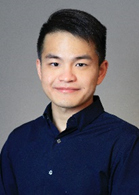
We are proud to announce that Dr. Weizhen Xie (Zane) recently won the NIH Pathway to Independence Award, which provides an opportunity for promising postdoctoral scientists to receive both mentored and independent research support. The award facilitates up to 5 years of support consisting of two phases. The initial, or mentored phase (K99), provides 1-2 years of mentored support to promising postdoctoral research scientists. The K99 phase is followed by up to 3 years of independent support contingent on the scientist securing an independent research position.
Dr. Xie’s proposal titled “A Neurocognitive Basis of Remembering Driven by Prior Semantic Knowledge” was recommended for intramural funding. The initial K99 phase will be provided under the supervision of Dr. Kareem Zaghloul and Dr. Christopher Baker.
About Dr. Xie: He completed his doctoral training in Cognitive Psychology at the University of California, Riverside in 2018. Currently, he studies human brain and behavior to understand representations and processes of memory and cognition, including questions regarding the quantity and quality of memories, interaction across different states of memory representations, and compromised memory functions in neurological and psychiatric disorders.
Congratulations Dr. Hardy – Recipient of the Intramural Competitive Fellowship Award (NCFA)
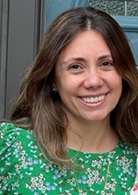
We are happy to announce that Dr. Raiza Hardy’s Intramural Competitive Fellowship Award (NCFA) was approved by the Office of the Scientific Director (OSD). Dr. Hardy has a Ph.D. in Cell and Molecular Physiology from Loyola University Chicago. Her dissertation aimed at understanding how gut microbiome dysbiosis in obese individuals could be linked to neuropathy and neuropathic pain.
Everyday tasks such as walking, eating, drinking, and reaching and grasping objects are dexterous movements that require sensory information from touch neurons and proprioceptors for limb coordination. Piezo2 is a stretch- gated ion channel required for mechanotransduction. The importance of this gene is highlighted in humans with PIEZO2 loss of function mutations who have major impairments in touch discrimination and skilled reaching. Similarly, mice lacking functional Piezo2 have improper limb positioning and poor coordination. However, to date, the contribution of distinct mechanoreceptor subtypes for dexterous behavior is unclear. Dr. Hardy’s aim is to untangle the role of Piezo2 in specific neuronal classes for the execution of innate and learned dexterous movements.
Dr. Hardy intends to run her own laboratory as an independent academic researcher, seeking to have the freedom to investigate questions pertaining to the somatosensation field. She takes pride in producing high-quality, rigorous, and cutting-edge work; mentoring and guiding trainees; and serving as a role model to women and individuals from underrepresented groups and/or disadvantaged backgrounds. Dr. Hardy is certain that the postdoctoral training that she will obtain in Dr. Chesler’s lab during the NCFA fellowship award will be a solid foundation for her future career.
Dr. Elizabeth Daley Receives NINDS Competitive Fellowship Award (NCFA)
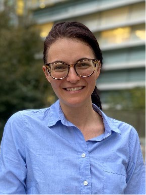
Dr. Elizabeth (Beth) Daley, a postdoc Fellow in Dr. Antonina Roll-Mecak’s lab, recently received an NCFA for her proposal, Writing and Reading Polyglutamylation Patterns in the Neuronal Microtubule Array. Dr. Daley’s project will explore for the first time how each writer and eraser contribute to tubulin glutamylation patterns, what modification-dependent effects exist related to axon specification, neuronal morphology, MAP interaction, and neuronal transport in human neurons, and how tubulin modifications and neuronal MAPs cooperate to regulate neuronal trafficking. The proposed experiments will shed light on how neurons functionalize their microtubule cytoskeletons to support the complex, high-volume intracellular trafficking needed for neuronal signaling and has direct implications for understanding neurological disease caused by defects in axonal transport and glutamylation.
Congratulations Again Price Withers!

Price Withers - a postbaccalaureate fellow under the supervision of Dr. Sara Inati (Neurophysiology of Epilepsy Unit), and recent recipient of the NINDS Clinical Research Excellence Award (NCREA) - will be given a monetary travel award for his abstract titled Source Localization of iEEG Interictal Epileptiform Activity Using Estimates of Gray and White Matter Propagation, which was accepted and will be presented at the 2022 American Epilepsy Society meeting.
Price will also be given the opportunity to present his abstract at a Spring 2023 Grand Rounds lecture. This award is aimed at promoting clinical research and recognizing clinical research achievements among NINDS Clinical Research Trainees and Clinical Nursing Staff. Monetary awards, where funding is added to the PI’s budget to supplement the awardee’s research and training activities.
NINDS TmT Competition Winner

Price Withers, postbaccalaureate (postbac) fellow in the NINDS Division of Intramural Research, received a first-place score during the internal NINDS Three-minute Talk (TmT) competition on June 2, 2022. This achievement allowed Withers to compete with trainees from 11 other NIH institutes and centers in the NIH-wide TmT competition later that month on June 30, 2022. During an impressive three-minute presentation, he showed that a new method to localize the origin of seizure activity in the brain has potential to guide surgical interventions with more resolution than current methods.
Learn more about Wither’s research and career goals—and his experience at the NIH so far—in our Training Highlight article: Meet the NINDS TmT Competition Winner: Postbac Price Withers.
Fellow Award for Research Excellence (FARE)
The Fellows Award for Research Excellence (FARE), began in 1995 to recognize the outstanding scientific research performed by intramural postdoctoral fellows. The FARE award is sponsored by the NIH Fellows Committee, the Scientific Directors, and the NIH Office of Intramural Training & Education, and is funded by the Scientific Directors.
The NINDS is very pleased to announce the winners of the 2023 FARE competition. Below are the NINDS award recipients along with their respective mentors. We extend sincere congratulations to our nine winners for their successes and the honor they bring to the intramural program of our institute.
Exceptional Post-Doctoral Fellows Recognized at International Lewy Body Dementia Conference
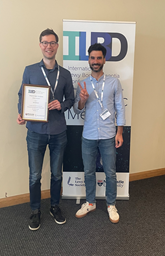
Two post-doctoral fellows in Dr. Sonja W. Scholz lab – Dr. Karri Kaivola (pictured left) and Dr. Paolo Reho (pictured right) – were recognized at this year’s International Lewy Body Dementia Conference (ILBDC), which took place on June 18, 2022 at the Newcastle-Gateshead Hilton Hotel, in Newcastle, UK. The ILBDC brings together renowned laboratory and clinical scientists, and has been pivotal in the development of diagnostic and management criteria for Lewy body dementia.
In a memorable ceremony, Dr. Karri Kaivola was the recipient of the Rising Star Award for the study “Structural Variation in Lewy Body Dementia: A New Resource”. Dr. Paolo Reho received a Poster Prize for the outstanding presentation titled “Identification of Differential Methylation Signatures in Neuropathologically Confirmed Lewy Body Dementia.”
Congratulations to these exceptional professionals!
Congratulations Dr. Michelle Pleet!
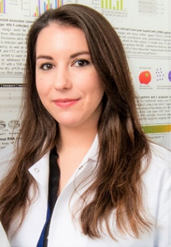
Michelle Pleet, Ph.D. – a Postdoctoral Fellow – recently won a major grant to further her research on the importance of extracellular vesicles (EVs), which are packets of information released from cells into the blood and other bodily fluids, in Multiple sclerosis (MS).
Dr. Pleet and her team are investigating whether EVs obtained from blood and spinal fluid from people with MS will provide information about the cell types involved in causing MS. The aim is to:
- Characterize EVs isolated from MS patient cerebrospinal fluid (CSF) and CSF samples from healthy volunteers and individuals with other chronic neurological diseases by concentration and surface markers which can be used to predict the EV’s cellular origin.
- Examine the contents of these EVs to identify unique cargo that may play a role in the activation or progression of disease.
Results from this very important study may suggest new biomarkers of MS and additional information about the cause(s) of MS, which may lead to more targeted treatments and possible prevention strategies.
About Dr. Pleet
Dr. Pleet earned her Ph.D. in biosciences from George Mason University. She has received honors and awards, including the School of Systems Biology Impact Award, the School of Systems Biology Ph.D. Student Research Fellowship, and the School of Systems Biology John N. Brady Award for Excellence in Retrovirus Research, while at George Mason University.
NINDS Competitive Fellowship Award (NCFA) Recipient
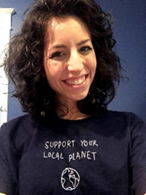
Dr. Stephanie Sarbanes, in Dr. Antonina Roll-Mecak’s lab, received the NINDS Competitive Fellowship Award (NCFA) for her proposal “Investigation of the tubulin autoregulatory response at the mechanistic level and in the human neuron”. Microtubules are comprised of alpha/beta-tubulin heterodimers that self-assemble from a soluble tubulin pool into dynamic polymers. The cell carefully monitors this balance between soluble pool and polymer through a unique feedback mechanism termed “tubulin autoregulation”. When cells detect large influxes of soluble tubulin (ex. upon MT depolymerization) they rapidly respond by identifying tubulin-translating ribosomes and destroying the associated tubulin mRNA.
While many components in this pathway remain unknown, identification of this subset of ribosomes depends upon TTC5, a protein whose mutation has been recently associated with intellectual disability. Nevertheless, tubulin autoregulation in neurons, whose architecture and action are highly-dependent on the microtubule cytoskeleton, is largely unexplored. Dr. Sarbanes’ project seeks to uncover additional factors required by the autoregulatory pathway and explore the role of TTC5 in MT homeostasis in the human neuron both across differentiation and upon neuronal injury. She will carry out this work under the co-mentorship of Dr. J. Robert Hogg (NHLBI).
NMSS Sylvia Lawry Physician Grant Recipient

Congratulations to Dr. Kanika Sharma, Clinical Fellow in the Translational Neuroradiology Section. As announced in the OCD newsletter, Dr. Sharma received the National Multiple Sclerosis Society (NMSS) Sylvia Lawry Physician Grant. This Fellowship program provides the individual with an M.D. or equivalent medical degree with up to 3-years of formal training, under the tutelage of an established investigator, in key elements associated with conducting clinical trials in MS.
NCFA Award Recipient
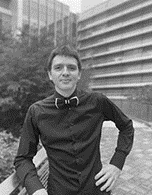
Dr. Ilia Zhernov, in Dr. Antonina Roll-Mecak’s lab, received an NINDS Competitive Fellowship Award (NCFA) for his proposal entitled Combinatorial regulation of katanin-induced microtubule remodeling. Katanin, a microtubule severing enzyme is associated with microcephaly in humans and its loss has been shown to be important for normal neuronal development in many model systems. Dr. Zhernov aims to unravel how synergistic activities of katanin and the neuronal regulators of microtubule dynamics, CLASP2a, chTOG and KIF2A, control exchange of microtubule subunits called tubulin at the microtubule shaft. These proteins can sway the equilibrium between addition and removal of tubulin at sites of microtubule nanodamage introduced by katanin and thereby can determine whether the microtubule network is completely disassembled or amplified.
Dr. Zhernov will use a combination of high-resolution imaging approaches in vitro and in neurons to study how these proteins synergize with katanin to control the fate of the microtubule and the overall architecture and dynamics of microtubule arrays. The results from this study will shed light on regulation of the architecture of neuronal microtubule networks.
Veronica Ryan Accepted into PRAT Program
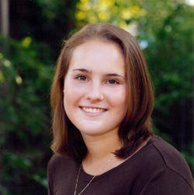
Congratulations to Veronica Ryan, of the Inherited Neurodegenerative Diseases Unit, who recently received an NIGMS Postdoctoral Research Associate Training (PRAT) award. The NIGMS PRAT Program is a competitive three-year postdoctoral fellowship program that provides high quality research training in the basic biomedical sciences in NIH intramural laboratories. The program prepares trainees for leadership positions in biomedical careers through mentored laboratory research, networking, and intensive career and leadership development activities. Dr. Ryan was accepted into the program for her proposal that investigates the mechanisms of mRNA transport granule assembly in neurons and how this assembly is altered in neurodegenerative disease, specifically amyotrophic lateral sclerosis and frontotemporal dementia (ALS/FTD). These studies will provide critical understanding of mRNA granule packaging and transport in neurons.
Fellow Deeya Garg was featured in the I Am Intramural Blog

This past summer, Deeya worked with IRP staff scientist Joe Steiner, Ph.D., who leads the Drug Development Unit at NINDS. Her project assessed the potential of using statin medications, normally used for managing blood cholesterol and staving off heart disease, to stop HIV infection from destroying brain cells. This relatively understudied effect of HIV can cause a spectrum of neurological problems collectively known as HIV-associated neurocognitive disorder (HAND). Per Deeya, “There is currently no effective treatment against HAND despite the nearly 500,000 individuals experiencing the disorder in the United States alone,” Deeya says. “Approaching HIV from a cognitive lens was particularly unique and exciting to me!” Read more.
Fellow Award for Research Excellence (FARE)
The NINDS is very pleased to announce the winners of the 2022 FARE competition. Below are the NINDS award recipients along with their respective mentors. We extend sincere congratulations to our nine winners for their successes and the honor they bring to the intramural program of our institute.
Congratulations to NINDS Clinical Research Excellence Award (NCREA) Recipients
The NCREA award is aimed at promoting clinical research and recognizing clinical research achievements among NINDS Clinical Research Trainees and Clinical Nursing Staff.
NCFA Award Recipient
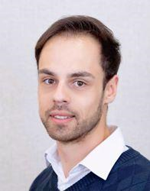
Dr. Fabrico Do Couto Nicola in Dr. Ariel Levine’s lab, received an NINDS Competitive Fellowship Award (NCFA) award for his project entitled The Spinal Cord Cells and Circuits for a Defined Motor Behavior. The spinal cord is the main link between the body and the brain. Understanding how the spinal cord circuits are organized and function are fundamental to understanding the nervous system's behavioral control. The spinal cord has a diversity of cell types underpinning the communication between the brain and the body, whose behavioral contribution remains largely unknown. Dr. Do Couto Nicola’s goal is to unravel how the spinal cord encodes a simple movement. To do so, he proposes to systematically probe the diverse spinal cord cell types involved in a single movement (jumping) and thereby understand how the spinal cord encodes and mediates this behavior.
NCFA Award Recipient
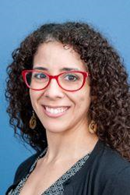
Dr. Jennifer Colon Mercado, in Dr. Michael Ward’s lab, received the NINDS Competitive Fellowship Award (NCFA) for her proposal Investigating Mechanisms of VCP-related Neurodegeneration using iPSC-derived Neurons and Muscle. Mutations in Valosin Containing Protein (VCP) can cause a combinatorial spectrum of Amyotrophic Lateral Sclerosis (ALS), frontotemporal dementia, myopathy, or multisystem proteinopathy.
Additionally, her project will investigate the consequences of mutant VCP in protein turnover, pathology, and functionality using iPSC-derived motor neurons and a novel neuromuscular junction model. Her goal is to broaden understanding of the human motor neuron pathology and the functional phenotypes related to ALS, leading to new treatment insights.
Pew Latin American Fellows Award
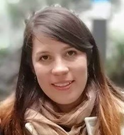
The Pew Charitable Trusts has announced that Eunice A. Domínguez-Martín, Ph.D., an NIH post-doctoral fellow, is one of 10 recipients of an award from Pew’s Latin American Fellows Program in Biomedical Sciences. Dr. Domínguez-Martín works in the laboratory of Richard J. Youle, Ph.D., senior investigator at the NIH’s National Institute of Neurological Disorders and Stroke, where she is currently conducting pre-clinical research on the role the innate immune system may play in damaging the brain during Parkinson’s disease. Read more.
Dr. Jacey Chen receives NCFA Award
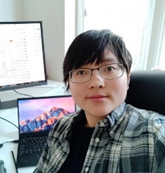
Dr. Jacey Chen, a Research Fellow in the Cell Biology and Biophysics Section, received an NINDS Competitive Postdoctoral Fellowship Award this past April. Her proposal entitled Mechanistic Studies of Microtubule Deglutamylation Enzymes Associated with Neurodegeneration focuses on understanding the mechanism of two of the main enzymes that function as erasers of the tubulin code. The Cell Biology and Biophysics Section led by Dr. Antonina Roll-Mecak provides the perfect environment for such a project given her extensive understanding of how the genetic and chemical diversity of tubulin regulates the dynamics and mechanical properties of microtubules and constitutes a code that is interpreted by microtubule-based motors and associated proteins.
Dr. Chen will express tubulin carboxypeptidases for structural and biophysical analyses, to understand how they specifically recognize the tubulin substrate and glutamate chains and how they affect microtubule dynamicsutilize. She will use a combination of structural biology approaches (X-¬ray crystallography and cryo-¬EM), enzymology and analytical mass spectrometry to understand how these enzymes recognize their substrate. She also plans to reconstitute microtubule dynamics in vitro in the presence of the two enzymes to understand the effects of the glutamylation/deglutamylation cycle on microtubule dynamics. This is an ambitious proposal, success on this project would provide the first high-resolution structure for any enzyme of the cytosolic carboxypeptidase (CCP) family. Dr. Chen’s long-term goal is to dissect protein mechanism using a multifaceted experimental approach that gives her information about proteins at different spatial and temporal scales.
Dr. Sarah Hill receives award from BrightFocus Foundation

Sarah Hill, Ph.D., received an award from the BrightFocus Foundation for her Alzheimer grant application entitled, Investigating Coordinated Local Translation and Degradation in Axons and the Role of FTD-related Genes. BrightFocus provides research funds for U.S. domestic as well as international researchers pursuing pioneering research leading to greater understanding, prevention, and treatment of Alzheimer's disease. Dr. Hill is a Fellow mentored in the Inherited Neurodegenerative Diseases Unit under Dr. Michael Ward. Neurons must balance the removal of old proteins with the synthesis of new proteins. This is especially important at synapses, which are often located far from the cell body. Dr. Hill’s study we will test if local degradation at lysosomes fuels new protein synthesis, and how these processes are coordinated and altered during neurodegenerative disease.

